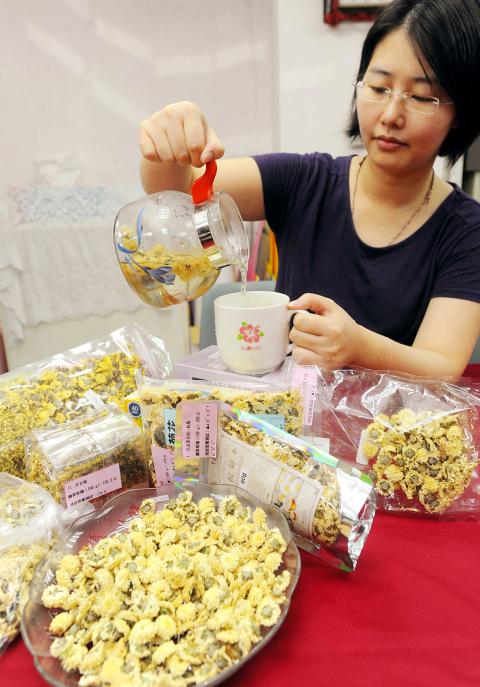Safety examinations on 20 kinds of herbal teas showed that nine kinds of chrysanthemum drinks contained pesticide residue, with eight of them exceeding regulated safety limits, the Consumers’ Foundation said yesterday, urging consumers not to drink the first infusion of tea.
The foundation purchased 20 kinds of herbal teas, including nine chrysanthemum teas, three rose teas, three lavender teas, two chamomile teas and three herb teas with dried berries, from various stores in Taipei City and New Taipei City (新北市) and had them tested for heavy metal, sulfur dioxide and pesticide residues in July.
Although the tests found levels of sulfur dioxide and heavy metal substances — such as cadmium and lead — in the 20 kinds of herbal tea were untraceable or within regulated safety limits, half of the herbal teas did contain pesticide residues.

Photo: Wang Yi-sung, Taipei Times
“Ten teas were found to contain pesticide residues and the majority [nine kinds] of those teas were chrysanthemum tea,” the foundation’s vice chairman Mark Chang (張智剛) said, adding that “several kinds of pesticides were found, with some chrysanthemum teas containing up to six or seven kinds of pesticides.”
A total of 18 kinds of pesticide residues were found, including carbendazim, dimethomorph and imidacloprid, which are often used on food products, the foundation said, adding that difenoconazole and flusiconazole, which are prohibited on spice and other herbal plants, were also found.
A mix of pesticides is commonly found in tests, but the mixture of different pesticides in the human body may cause a “cocktail effect,” meaning that substances become more difficult to eliminate from the body when they are mixed together, the foundation said, adding that some of the combinations of pesticides are even carcinogenic.
Local governmental health divisions should come up with a better method of monitoring pesticide use and the government should establish product certification and traceability mechanisms to ensure food safety, Chang said.
The foundation also urged consumers to avoid herb teas with unclear product labels and to pour away the first infusion of brewed tea to reduce the intake of pesticide residues.
“No matter if you brew the tea with hot water or cold water, pour away the first infusion,” National Taiwan University professor of horticulture and Consumers’ Foundation committee member Cheng Cheng-yung (鄭正勇) said. “If it contains pesticide, the first infusion will contain most of it.”

‘DENIAL DEFENSE’: The US would increase its military presence with uncrewed ships, and submarines, while boosting defense in the Indo-Pacific, a Pete Hegseth memo said The US is reorienting its military strategy to focus primarily on deterring a potential Chinese invasion of Taiwan, a memo signed by US Secretary of Defense Pete Hegseth showed. The memo also called on Taiwan to increase its defense spending. The document, known as the “Interim National Defense Strategic Guidance,” was distributed this month and detailed the national defense plans of US President Donald Trump’s administration, an article in the Washington Post said on Saturday. It outlines how the US can prepare for a potential war with China and defend itself from threats in the “near abroad,” including Greenland and the Panama

A magnitude 4.9 earthquake struck off Tainan at 11:47am today, the Central Weather Administration (CWA) said. The hypocenter was 32.3km northeast of Tainan City Hall at a depth of 7.3km, CWA data showed. The intensity of the quake, which gauges the actual effect of a seismic event, measured 4 in Tainan and Chiayi County on Taiwan's seven-tier intensity scale, the data showed. The quake had an intensity of 3 in Chiayi City and County, and Yunlin County, while it was measured as 2 in Kaohsiung, Nantou County, Changhua County, Taitung County and offshore Penghu County, the data showed. There were no immediate reports of

The Chinese Nationalist Party (KMT) is maintaining close ties with Beijing, the Democratic Progressive Party (DPP) said yesterday, hours after a new round of Chinese military drills in the Taiwan Strait began. Political parties in a democracy have a responsibility to be loyal to the nation and defend its sovereignty, DPP spokesman Justin Wu (吳崢) told a news conference in Taipei. His comments came hours after Beijing announced via Chinese state media that the Chinese People’s Liberation Army’s Eastern Theater Command was holding large-scale drills simulating a multi-pronged attack on Taiwan. Contrary to the KMT’s claims that it is staunchly anti-communist, KMT Deputy

RESPONSE: The government would investigate incidents of Taiwanese entertainers in China promoting CCP propaganda online in contravention of the law, the source said Taiwanese entertainers living in China who are found to have contravened cross-strait regulations or collaborated with the Chinese Communist Party (CCP) could be subject to fines, a source said on Sunday. Several Taiwanese entertainers have posted on the social media platform Sina Weibo saying that Taiwan “must be returned” to China, and sharing news articles from Chinese state media. In response, the Mainland Affairs Council (MAC) has asked the Ministry of Culture to investigate whether the entertainers had contravened any laws, and asked for them to be questioned upon their return to Taiwan, an official familiar with the matter said. To curb repeated